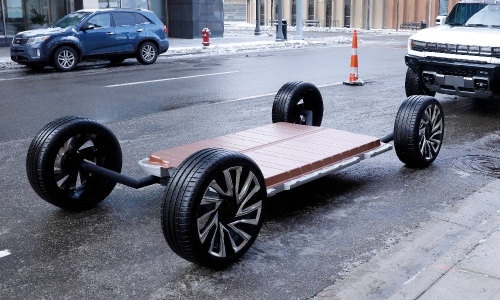Bahrain accelerates towards electric future, leaving fossil fuels behind
TDT | Manama
The Daily Tribune – www.newsofbahrain.com
Bahrain has set the wheels rolling for plugging in vehicles and cutting down on its dependency on fossil fuels to complete its Net Zero journey by 2060.
For this, the Kingdom needs an appropriate Electric Vehicle Strategy that would help increase the uptake of EVs, reduce emissions and improve the quality of life for all.
Helping authorities achieve this electric dream will be Deloitte & Touche Middle East. According to Tender Board, the Electricity and Water Affairs has awarded Deloitte & Touche a BD112,722.000 contract to set a suitable strategy in three month.
The strategy should help Bahrain drive its EV penetration journey in a controlled and sustainable way, for this is also crucial for Bahrain to meet climate targets.
It’s worth knowing that Bahrain targets the reduction of carbon emissions by 30% through decarbonisation and energy efficiency initiatives, in addition to reaching Net Zero by 2060.
Deloitte & Touche LLP (DME) is the affiliate for the Middle East and Cyprus of Deloitte NSE LLP (NSE), a UK limited liability partnership and a member firm of Deloitte Touche Tohmatsu Limited, a U K private company limited by guarantee (DTTL).
As per tender board documents, the plan is to increase the usage of renewable energy sources, including solar power as an upstream source of electricity, reducing overall dependency on fossil fuels and lower pollution levels.
The strategy will also focus on reducing the overall EV ownership costs for all stakeholders, including the government, industries, and private citizens. A nationwide EV charging infrastructure is also crucial, as the availability of charging points can still be a limiting factor for some EV owners.
Electric cars
Reportedly, Bahrain has already started works for developing electric cars, for which Marson Group, a Bahraini business and project development company has formed a partnership with Gauss Auto, an American manufacturing corporation.
The new plant in Salman Industrial City in the American Trade Zone will operate under the name Gauss Auto Bahrain. The plan is to produce a range of electric vehicles (EVs), including two-wheelers, three-wheel electric tricycles, and passenger vehicles.
Six bidders
The tender requesting proposals opened by EWA in February this year had disclosed bids from six players around the globe. McKinsey & Company (BHD 562.800), Egis International (BHD 174,685.720), PriceWaterhouseCoopers Bahrain (BHD 159,500.000), Arthur D Little (Bahrain) (BHD 435,158.000), Oliver Wyman FZ-LLC (BHD 517,000.000) and Deloitte & Touche (BHD 112,772.000) were the bidding companies.
Reduction of fossil fuel use ‘inevitable’: Emirati COP28 chief
Meanwhile, in a related development, the head of the upcoming COP28 climate summit, who also is the chief executive of the UAE’s national oil company, acknowledged yesterday that a reduction in the use of fossil fuels is inescapable.
“The phase down of fossil fuels is inevitable,” Sultan al-Jaber said on the sidelines of technical climate talks six months ahead of the summit. “The speed at which this happens depends on how quickly we can phase up zero carbon alternatives, while ensuring energy security, accessibility and affordability,” added Al Jaber, who runs the Abu Dhabi National Oil Company (Adnoc).
Al-Jaber defended a COP28 roadmap that includes a “global goal to triple renewable energy, double energy efficiency, and double clean hydrogen, all by 2030.” His comments came as numerous participants and observers in the UN climate negotiations have called on al-Jaber to explicitly acknowledge the importance of ending the use of fossil fuels, an objective no COP summit to date has been able to put down in writing.
On Wednesday, al-Jaber signed a statement with European Commission chief Ursula von der Leyen calling for “a transition towards energy systems free of unabated fossil fuels,” meaning fossil fuels without carbon capture systems, hinting at a possible compromise in the coming months between different camps in the negotiations.
“We must be laser-focused on phasing out fossil fuel emissions, while phasing up viable, affordable zero carbon alternatives,” al-Jaber said at an event in Germany last month.
Related Posts

